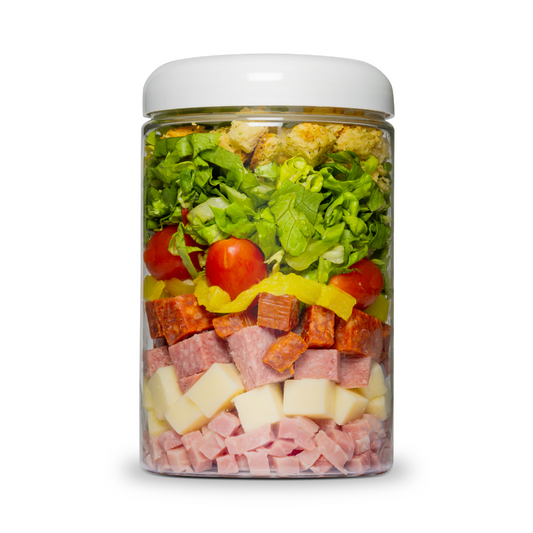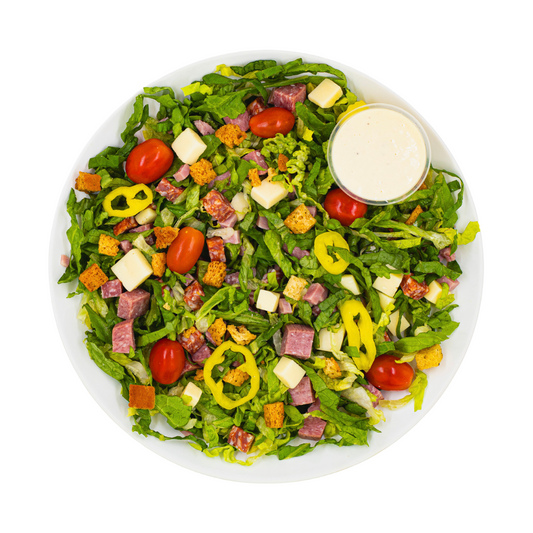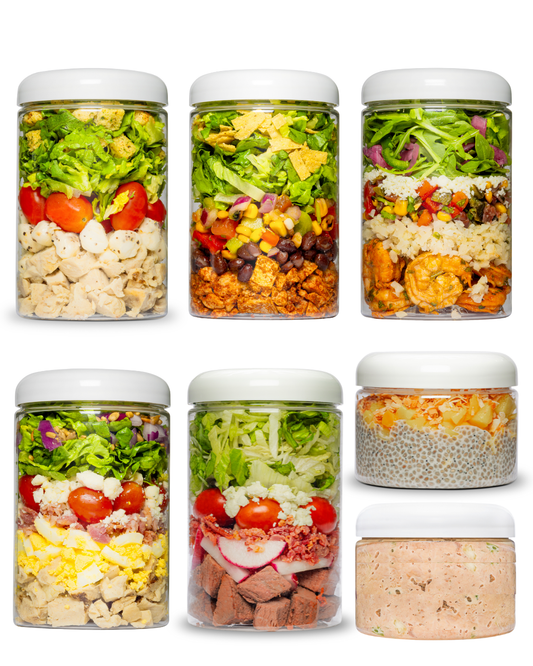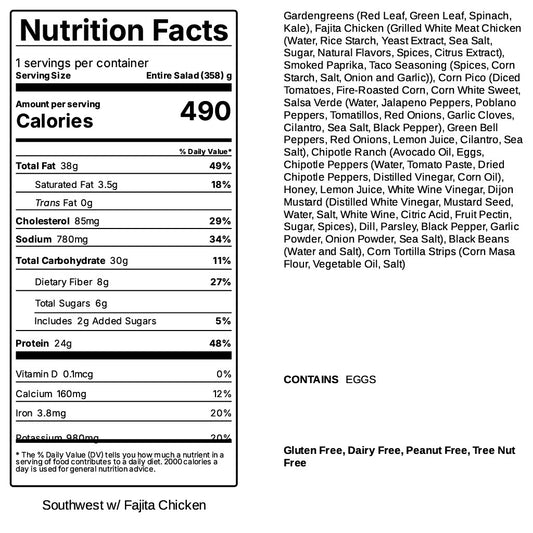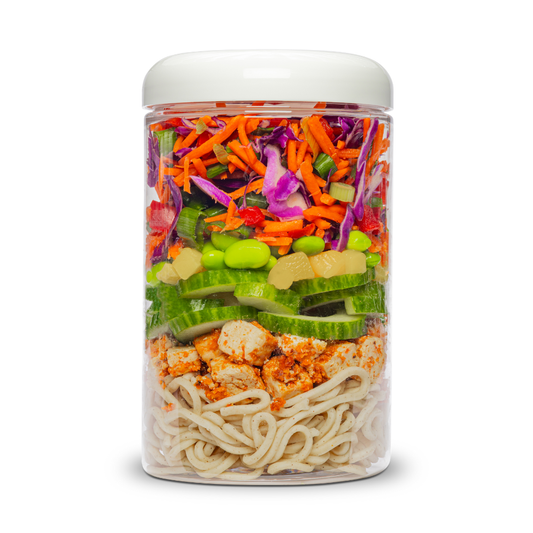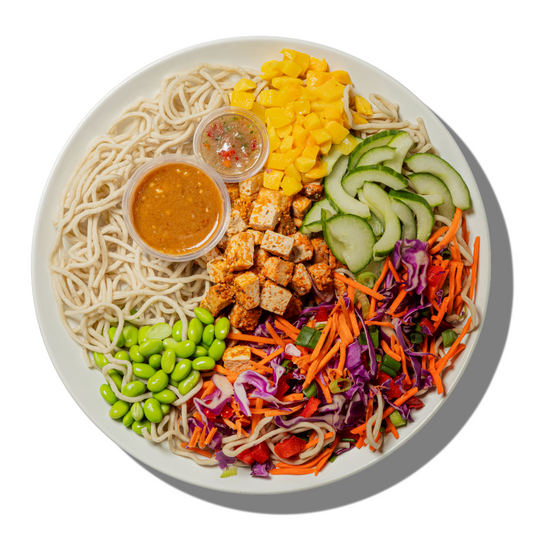The Best Postpartum Meal Delivery (That Doesn't Require a Forklift of Effort
Bringing home a baby changes everything—your sleep, your routine, your wardrobe, your energy... and definitely your ability to eat well. Between nursing sessions, diaper changes, and trying to remember what day it is, making meals can feel completely impossible.
That's exactly why GardenCup exists. Our mission is to make clean, protein-packed, no-prep meals accessible for real-life moments—especially the ones where you're running on three hours of sleep and one-handed multitasking.
This isn't a list of all the meal delivery options out there. This is a look at why GardenCup is the best postpartum meal delivery option for moms who want to feel nourished and normal again—without the prep, cleanup, or effort.
The Reality of Postpartum Eating (Spoiler: It's Complicated)
Let's get real about what eating looks like in those first few months. You might start the day with good intentions—maybe you'll make that smoothie or scrambled eggs—but then the baby needs to nurse for 45 minutes, followed by a diaper blowout that requires a complete outfit change (for both of you), followed by another feeding session.
Suddenly it's 2 PM, you've had coffee and maybe a granola bar, and you're wondering how other moms seem to have their act together enough to post Instagram stories of their "nourishing postpartum meals."
The truth is, most postpartum nutrition advice is completely disconnected from postpartum reality. Articles about "meal prepping for new moms" assume you have weekend time to chop vegetables and prepare containers. Recommendations for "quick 15-minute meals" ignore the fact that your baby might decide those 15 minutes are perfect for a crying session.
What new moms actually need is food that requires zero mental energy, zero prep time, and can be eaten with one hand while bouncing a fussy baby. That's not lowering the bar—that's meeting moms where they actually are.
Why Postpartum Nutrition Matters (and Why Cooking Isn't Always an Option)
You just brought a human into the world. Your body performed the ultimate marathon, and now it's in recovery mode while simultaneously being asked to function on minimal sleep and maximum demand. Your hormones are shifting, your energy reserves are depleted, and if you're breastfeeding, you're burning an extra 300-500 calories per day.
The nutritional stakes are higher than ever:
- Your body is healing from pregnancy and delivery, requiring extra protein for tissue repair
- Your energy needs are elevated but your ability to obtain that energy through food is severely compromised
- If you're breastfeeding, your nutritional needs increase significantly—you need extra protein, healthy fats, and calories
- Your mental health depends on stable blood sugar and adequate nutrition, especially during hormonal fluctuations
- Your long-term recovery is influenced by how well you nourish yourself in these crucial early weeks
But here's what traditional postpartum nutrition advice misses: cooking is often not an option. When you're surviving on 2-3 hour sleep chunks, the idea of meal planning, grocery shopping, and cooking feels not just difficult but actually impossible.
Postpartum moms need more than snacks. Crackers and cheese might get you through the moment, but they won't sustain your energy, support your healing, or prevent the 3 PM crash that leaves you feeling depleted. They need real meals that:
- Help rebuild strength and energy with substantial protein (15-25g per meal)
- Are fiber-rich to support digestion (which postpartum hormones can disrupt)
- Provide sustained energy without blood sugar spikes and crashes
- Don't require time, thought, planning, or dishes
- Can be eaten quickly and efficiently, often while multitasking
- Actually taste good enough to look forward to
And that's exactly what GardenCup delivers.
The Hidden Challenges of Postpartum Eating
The One-Hand Reality
Most meals require two hands to prepare and eat. New moms often find themselves eating with one hand while holding, feeding, or soothing a baby with the other. Traditional salads fall apart, sandwiches require assembly, and hot meals need utensils and attention.
The Unpredictable Schedule
Meal times become suggestions rather than schedules. You might plan to eat lunch at noon, but baby's needs dictate that lunch actually happens at 2:30 PM—or gets interrupted three times and eaten in stages over two hours.
The Mental Load Overload
Decision fatigue hits hard when you're sleep-deprived. Even simple choices like "what should I eat?" can feel overwhelming when your brain is already managing feeding schedules, diaper counts, and trying to remember if you brushed your teeth today.
The Energy Paradox
You need energy to make food, but you need food to have energy. When you're running on empty, the idea of cooking—even something simple—can feel insurmountable. This creates a cycle where poor nutrition leads to lower energy, which leads to worse food choices.
The Guilt Factor
Society expects new moms to "bounce back" while simultaneously being perfect mothers. There's subtle shame around not having the energy to cook "real" meals, leading to guilt about ordering takeout or eating convenience foods. This guilt doesn't help anyone and ignores the reality of postpartum recovery.
What Makes GardenCup Perfect for Postpartum Life
Zero Prep, Maximum Nutrition
Just grab a jar, pour in the dressing, shake, and eat. That's it. No chopping, no cooking, no assembly required. The most complicated thing you'll do is twist off a lid—which you can do one-handed if necessary.
This isn't about being lazy. This is about recognizing that your energy is precious and should be spent on recovery and bonding with your baby, not on food preparation.
Ready When You Are (Finally)
Meals stay fresh for 5–6 days, so you can eat whenever you finally get a free minute. Whether that's 11 AM between feedings or 3 PM during a rare nap window, your lunch is waiting and still perfectly fresh.
The extended shelf life eliminates the pressure of "use by" dates that add stress to an already overwhelming time. You can stock your fridge and know that healthy options are available whenever you need them.
Clean Ingredients for Clean Recovery
No seed oils. No preservatives. Just real food layered fresh in every cup. During postpartum recovery, your body is already working overtime. The last thing it needs is to process artificial ingredients, preservatives, or inflammatory oils.
Every ingredient is chosen for both nutrition and flavor, supporting your body's healing process while actually tasting like food you want to eat.
One-Hand Friendly Design
You can hold a baby in one arm and still eat lunch with the other. The jar design is specifically built for this reality—wide enough for easy eating, stable enough not to tip over, and requires only a fork (which comes with each meal).
This might seem like a small detail, but for new moms who often eat while feeding or holding their baby, it's revolutionary.
Protein-Packed for Real Recovery
From grilled chicken to chickpeas to hard-boiled eggs, every meal is built to satisfy and support your body. With 15-25g of protein per meal, you're getting the building blocks your body needs for healing, energy, and milk production if you're breastfeeding.
The protein content is specifically designed to keep you full and energized for 3-4 hours, preventing the snack-trap cycle that leaves you feeling unsatisfied and constantly searching for something else to eat.
No Subscription Lock-In (Because Life Is Unpredictable)
Order what you want, when you want. You're in control. Some weeks you might need 9 meals because your partner is traveling. Other weeks you might need just 6 because your mom is visiting and cooking. The flexibility matches the unpredictable nature of early motherhood.
The Science Behind Postpartum Nutrition Needs
Protein Requirements Increase
Breastfeeding moms need an additional 25g of protein per day beyond normal requirements. This means aiming for 71-75g of protein daily—significantly more than the standard 46g recommended for women.
GardenCup meals provide 15-25g of protein each, making it easy to meet these elevated needs without having to calculate or plan. Two GardenCup meals can provide 30-50g of protein, covering most of your daily needs.
Caloric Needs Are Higher
Breastfeeding requires an additional 300-500 calories per day, but these should be nutrient-dense calories, not empty ones. The combination of protein, healthy fats, and complex carbs in GardenCup meals provides sustained energy rather than quick spikes and crashes.
Micronutrient Demands Increase
Iron, calcium, vitamin D, and B vitamins are all crucial during postpartum recovery. The variety of vegetables, proteins, and healthy fats in GardenCup meals helps ensure you're getting a range of essential nutrients without having to think about supplementation strategies.
Hydration Needs Are Critical
Breastfeeding increases fluid needs significantly. While GardenCup meals aren't beverages, their high water content from fresh vegetables helps contribute to overall hydration while providing nutrition.
Sample Postpartum Meal Plans
Week 1-2: Recovery Focus
Emphasis on easy digestion and maximum nutrition
Monday: Chicken Bacon Cobb
- Why it works: High protein (22g) for healing, easy to digest, comfort food vibes
- Timing: Perfect for when you need something substantial but familiar
- One-hand factor: Excellent—all ingredients stay put when eating
Tuesday: Greek Goddess Bowl
- Why it works: Light but satisfying, herbs aid digestion, feta provides calcium
- Timing: Good for days when you want something fresh but not heavy
- Recovery benefit: Anti-inflammatory herbs, probiotics from feta
Wednesday: Tex-Mex Chicken Bowl
- Why it works: Balanced macros, fiber from beans, warming spices
- Timing: Midweek energy boost with complex flavors
- Comfort factor: Familiar flavors, satisfying textures
Thursday: Buffalo Ranch Chicken Bowl
- Why it works: High protein, bold flavors for taste bud satisfaction
- Timing: When you need something with personality to break up routine
- Energy benefit: Spices can help boost metabolism and mood
Friday: Harvest Veggie + Quinoa Bowl
- Why it works: Plant-forward nutrition, fiber for digestion, complete proteins
- Timing: End-of-week reset with maximum vegetable intake
- Recovery benefit: Antioxidants from colorful vegetables, sustained energy from quinoa
Week 3-6: Establishing Routine
Building sustainable eating patterns
As you settle into a rhythm, you can start identifying which meals you crave most and when. Some moms find they prefer lighter options in the morning and heartier meals in the afternoon. Others discover certain flavors appeal more during different phases of their cycle or energy levels.
Week 6+: Long-term Sustainability
Supporting ongoing energy and health
By this point, you'll have identified your favorites and can create a rotating menu that prevents boredom while ensuring consistent nutrition. Many moms settle into a pattern of 2-3 go-to meals plus 1-2 rotating options for variety.
Real Stories from Real Moms
Sarah, Mom of Two (ages 3 and 6 months)
"GardenCup literally kept me alive postpartum. I didn't have the brain power to cook or the energy to clean. My toddler would be pulling on my leg, the baby would be crying, and I could still grab a GardenCup and actually eat a real meal. This was my lifesaver."
Sarah's situation illustrates the reality of postpartum life with multiple children—the demands multiply, but the time and energy don't.
Maria, First-Time Mom
"It's one of the few things I could eat with a baby on me. I was breastfeeding constantly those first few weeks, and trying to eat regular food was impossible. I ordered a 9-pack every week and kept them lined up in my fridge like ammunition."
Maria's experience highlights how the physical demands of breastfeeding make traditional eating nearly impossible.
Jennifer, Working Mom
"I was skeptical about meal delivery, but by week 2 postpartum I had my fridge stocked. It was honestly the easiest part of those hard weeks. When everything else felt chaotic, at least I knew I had real food waiting for me."
Jennifer's story shows how having one less decision to make can provide psychological relief during an overwhelming time.
Amanda, Mom of Twins
"With twins, everything is multiplied—including how impossible it is to find time to eat. GardenCup was the only way I managed to get proper nutrition. I'd eat one while feeding the babies, and it was substantial enough to actually keep me going."
Amanda's twin experience demonstrates how GardenCup scales with increased demands.
Lisa, Postpartum with Complications
"I had a C-section and complications that made recovery longer. Standing in the kitchen to cook was exhausting. Having meals that required literally zero effort meant I could focus on healing instead of meal planning."
Lisa's experience shows how GardenCup supports different types of recovery situations.
Comparing Postpartum Meal Options
Traditional Meal Prep
Time required: 2-3 hours weekly Postpartum reality: Nearly impossible with newborn demands Success rate: Very low—most moms abandon within weeks Cost: $50-80 in groceries + time investment Flexibility: Low—meals planned in advance may not match daily needs
Takeout/Delivery
Time required: 20-30 minutes per order Postpartum reality: Expensive, inconsistent nutrition, decision fatigue Success rate: High short-term, unsustainable long-term Cost: $15-25 per meal + fees + tips = $20-35 per meal Flexibility: High but expensive
Meal Kit Services
Time required: 30-45 minutes cooking per meal Postpartum reality: Too much time and energy required Success rate: Low—boxes pile up unused Cost: $12-15 per serving + prep time Flexibility: Medium—can skip weeks but still requires cooking
GardenCup
Time required: 30 seconds per meal Postpartum reality: Perfect fit for actual lifestyle constraints Success rate: Very high—when food is ready to eat, you eat it Cost: $10-12 per meal, no additional fees Flexibility: High—order when needed, eat when ready
Nutritional Comparison: What Your Body Actually Needs
Protein Content Analysis
- Typical takeout salad: 8-12g protein
- Homemade sandwich: 10-15g protein
- GardenCup meals: 15-25g protein
- Postpartum need: 71-75g daily (breastfeeding moms)
Two GardenCup meals provide 30-50g protein, covering 40-70% of daily needs
Nutrient Density Comparison
Fast food lunch: High calories, low nutrients, often inflammatory ingredients Convenience store options: Processed foods, high sodium, limited nutritional value GardenCup meals: Nutrient-dense whole foods, anti-inflammatory ingredients, balanced macros
Satiety and Energy
Snack-based eating: Blood sugar spikes and crashes, constant hunger Processed convenience foods: Short-term satisfaction, long-term energy depletion GardenCup approach: Sustained energy, genuine satiety, stable blood sugar
Building Your Postpartum Support System
Practical Tips for Success
Stock your fridge strategically: Keep 3-4 GardenCup meals available at all times so you always have options.
Eat when you can, not when you "should": If you're hungry at 10 AM or 4 PM, eat. Your body's needs are different now.
Don't eat alone if possible: Invite your partner, family member, or friend to eat with you when they can. Social connection during meals improves satisfaction and mental health.
Keep backup snacks: While GardenCup provides substantial meals, having nuts, fruit, or yogurt available fills gaps between meals.
Hydrate consistently: Keep a large water bottle nearby and refill it regularly, especially if breastfeeding.
Creating Sustainable Habits
Start with small orders to test preferences, then scale up once you find favorites.
Rotate flavors weekly to prevent boredom and ensure variety in nutrients.
Plan for different scenarios: Stock extra meals for particularly difficult days or when support isn't available.
Communicate needs to your support system: Let family and friends know that having easy, healthy meals available is a priority for your recovery.
The Long-Term Perspective
Building Healthy Patterns
The habits you establish during postpartum recovery often continue long-term. By choosing nutrient-dense, convenient options now, you're setting yourself up for sustained healthy eating as your child grows.
Modeling for Your Children
Kids learn eating habits by observation. When they see you prioritizing nutrition and making healthy choices (even convenient ones), they internalize these values. There's no shame in choosing efficiency when it supports overall health.
Supporting Your Mental Health
Proper nutrition directly impacts mood, energy, and resilience. During a time when mental health challenges are common, ensuring consistent, quality nutrition is a form of self-care that benefits both you and your baby.
Preparing for the Future
The organizational skills and systems you develop now will serve you as your family grows. Learning to prioritize efficiency without sacrificing health creates a foundation for managing family nutrition long-term.
Addressing Common Concerns
"Is meal delivery too expensive when we have a new baby?"
Consider the total cost: GardenCup meals cost less than most takeout options and eliminate food waste from unused groceries. The time saved can be spent on recovery, bonding, or even work if you're transitioning back. Many families find they save money overall by reducing impulse food purchases and wasted ingredients.
"Should I feel guilty about not cooking?"
Absolutely not. Your job right now is to recover, bond with your baby, and adjust to massive life changes. Cooking is a skill and hobby, not a moral obligation. The healthiest choice is the one that gets nutritious food into your body consistently.
"Will I become dependent on meal delivery?"
GardenCup is a tool, not a crutch. Many moms use it intensively during early postpartum weeks, then gradually incorporate more cooking as their energy and routine stabilize. Some continue using it long-term because it works for their lifestyle. Both approaches are valid.
"What if my baby has dietary restrictions that affect breastfeeding?"
GardenCup's clean ingredient lists make it easy to identify potential triggers. The variety of options means you can eliminate specific ingredients while still having plenty of choices. Common allergens are clearly labeled.
Final Thoughts: Feeding Yourself Shouldn't Be the Hard Part
You're doing enough already. You're healing from childbirth, learning to care for a tiny human, adapting to massive hormonal changes, and functioning on minimal sleep. Adding meal planning, grocery shopping, and cooking to that list isn't heroic—it's unrealistic.
Let GardenCup take care of lunch. No cooking. No dishes. No guilt. No mental energy required. Just real food that keeps you going when everything else feels chaotic.
This isn't about being perfect—it's about being practical. The best nutrition plan is the one you'll actually follow. The healthiest meal is the one you'll actually eat. The most sustainable approach is the one that supports your overall well-being without adding stress to an already demanding time.
Your recovery matters. Your energy matters. Your mental health matters. And sometimes, the most caring thing you can do for yourself and your family is to choose the path that supports your health without depleting your resources.
You don't have to do it all. You don't have to be superhuman. You just have to be fed, and we can help with that.
👉 Ready to nourish yourself without the effort? Build your postpartum box now →
Because taking care of yourself isn't selfish—it's essential.


